Iran Tests Defenses Against Cruise Missiles, Winged Munitions In Drills
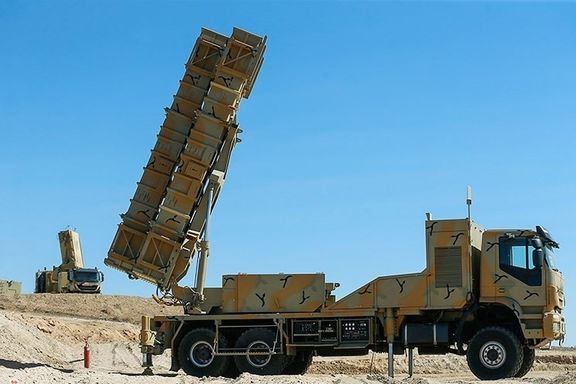
The commander of Iran’s Revolutionary Guard Aerospace Force has praised the use of homegrown technologies and young cadres in air defense drills this week.

The commander of Iran’s Revolutionary Guard Aerospace Force has praised the use of homegrown technologies and young cadres in air defense drills this week.
General Amirali Hajizadeh was quoted by Fars news as saying that almost all radar and other equipment used in the drills on Tuesday and Wednesday were made in Iran, while 15 years ago “we were not in this situation”.
Hajizadeh explained that one purpose of the drills was to test newly trained cadres who must learn the nature of teamwork in air defense operations. He added that for the first time Iran used cruise missiles and winged munitions fired from aircraft to keep them under radar surveillance. He claimed that all incoming threats were neutralized.
On Tuesday, Brigadier General Ghader Rahimzadeh, commander of the joint air defenses headquarters (Army & IRGC) said the drills aimed to evaluate the impact of possible electronic warfare of an adversary on Iran’s air defense radars. He added that the exercise was successful in identifying targets in an “environment of electronic warfare.” He added that locally manufactured electronic warfare equipment is being used in this exercise. On Tuesday, jamming drones were used to test anti-aircraft interception systems and the stable operation of radars.

The United States is on the verge of being defeated and expelled form the Middle East, the operations chief of Iran’s Revolutionary Guard has said on Tuesday.
General Abbas Nilforushan told Tasnim news website affiliated with the Islamic Revolution Guard Corps (IRGC) that “there is no American today who is not ashamed of the way US forces escaped from Afghanistan after occupying the country for 20 years.”
This was the result of “accumulated strategic mistakes and lack of a good understanding of cultural factors in the region”, the Iranian commander said, but did not elaborate.
Nilforushan emphasized that geopolitical conditions in the region are changing in favor of the Islamic Republic and its allies, which will lead to a complete pullout of the United States from its current bases.
He also claimed that Israel is on the verge of collapse under the pressure of Iran and its allies.

Tehran has called for the withdrawal of US forces from Iraq after its top Middle East operator, Qasem Soleimani was killed by American drones in January 2020 as he arrived in Baghdad. Iran-backed Shiite militias have been harassing the relatively small number of US forces remaining in Iraq by periodic rocket and drone attacks.
Anti-American rhetoric, particularly by IRGC and its top officers has continued and Nilforushan’s interview with Tasnim is the latest example of attempts to present the US as weak and Iran as victorious after events in Afghanistan.
The IRGC general said he believes the Americans have not given up and will try new ways to compensate. One of these is relying on others to project power and try to save Israel from defeat, but they have lost their levers of power.
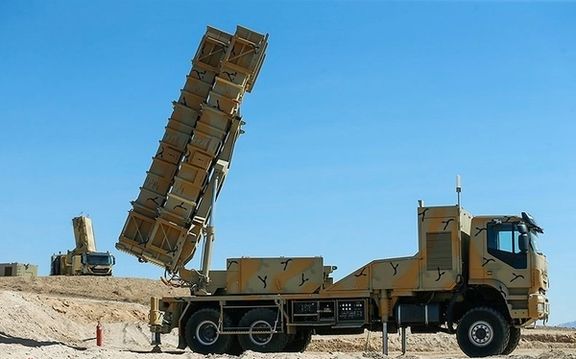
Asked if the US withdrawal from West Asia is a response to China’s growing power or a result of a Democratic administration unwilling to use military force, Nilforushan said US foreign policy has a systemic nature and is not dependent on change of administrations, although they might employ different tactics. He added that if the United States wants to compete with China, “the real theater is the Middle East where the Chinese are gradually filling the economic vacuum” left by Washington.
“It is not correct to say that the Americans are fleeing the region based on a calculated strategy. They are fleeing because of the pressure of the resistance front and their own mistakes,” he said. Regarding US bases in the region, “It is better that the Americans choose the right option instead of being forced to flee like the Afghanistan model,” Nilforushan said.
The emphasis on the notion that the US is fleeing from the region, seems to be a calculated psychological campaign by the IRGC. In fact, the US still maintains its bases in the Persian Gulf, in Iraq and has a presence in Syria, in addition to close military cooperation with allies in the region.
Nilforushan also commented about Israel, saying that the “Zionist regime is completely encircled by the Islamic Republic”, and is trying to confront Iran by other means, but the IRGC has complete knowledge of what the US and Israel are attempting to do.
Several significant sabotage attacks have taken place against Iran’s nuclear, military and strategic targets since July 2020, widely thought to be the work of Israeli intelligence. Nevertheless, Nilforushan said Israel can pose no threat against Iran as its foundations are shaken and it cannot even confront the Gaza strip.
Tasnim quoted the IRGC general as saying, “For Israel’s annihilation there is no need for a military campaign.”
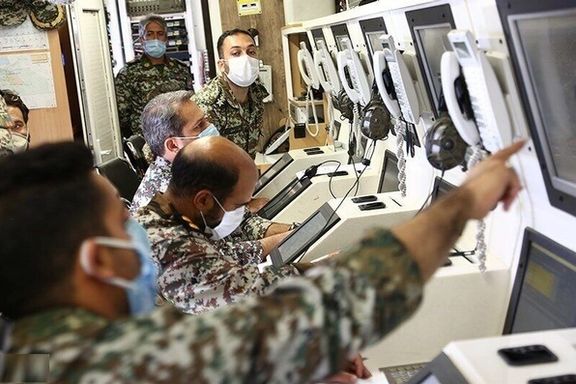
Iran’s air defenses conducted drills on Tuesday on countering electronic and cyber warfare, the Revolutionary Guard air defense headquarters announced.
Brigadier General Ghader Rahimzadeh, commander of the joint air defenses headquarters said that on the first day of drills dubbed Sky Defenders, units from Iran’s traditional army air defenses, IRGC Aerospace Force and the Air Force experimented with various tactics of countering electronic and cyber warfare.
Rahimzadeh said the drills aimed to evaluate the impact of possible electronic warfare of an adversary on Iran’s air defense radars. He added that the exercise was successful in identifying targets in an “environment of electronic warfare.” He added that locally manufactured electronic warfare equipment is being used in this exercise. In this stage jamming drones were used to test anti-aircraft interception systems and the stable operation of radars.
He added that “successful tests were conducted” on how to jam the adversary’s electronic warfare drones.
Iran’s radar systems, some based on domestic technology are not as advanced as need be in case of engagement with a technologically superior adversary.
Iran conducted major ground exercises last week on its northwestern borders near the Republic of Azerbaijan, after tensions flared up between the two counties.

Microsoft announced Monday that it has been tracking hacking activities by an Iran-linked group that targeted US and Israeli defense and other key companies.
The hackers were trying to guess passwords of users and accounts to penetrate defense technology companies and Persian Gulf ports of entry, as well as global maritime transportation companies with ties to the Middle East.
The group known as DEV-0343 was able to compromise just 20 passwords among hundreds it tried to penetrate, Microsoft said, adding, “DEV-0343 continues to evolve their techniques to refine its attacks. MSTIC noted that Office 365 accounts with multifactor authentication (MFA) enabled are resilient against password sprays.”
Iranian hackers have been highly active in the past decade and are believed to be as dangerous as Chinese and Russian groups that operate either within their respective intelligence services or are closely associated with them.
“Microsoft has directly notified customers that have been targeted or compromised, providing them with the information they need to secure their accounts,” the company said in a statement.
The focus of the hackers was defense technology companies working on military-grade radar development, drone technology, satellite systems and emergency response communication systems. “Further activity has targeted customers in geographic information systems (GIS), spatial analytics, regional ports of entry in the Persian Gulf, and several maritime and cargo transportation companies with a business focus in the Middle East,” Microsoft said.
As in the past cases of Iranian hacking aimed at military and sensitive economic targets this operation “likely supports the national interest of the Islamic Republic of Iran,” Microsoft said, and added, that its assessment shows “this targeting supports Iranian government tracking of adversary security services and maritime shipping in the Middle East to enhance their contingency plans.”
Microsoft did not attribute the hacking to any particular Iranian government entity, but the Islamic Revolution Guard Corps (IRGC) is known for its large ‘cyber army’ that engages in both suppression of internet access and cyber surveillance within Iran and disinformation activities abroad, as well as sophisticated hacking of Western and other targets.
Facebook also announced on Monday it has dismantled dozens of accounts engaged in dissemination of fake news within Iran. "We removed 93 Facebook accounts, 14 Pages, 15 Groups and 194 Instagram accounts in Iran that targeted primarily domestic audiences in that country, particularly in the Lorestan province," The social media company said.
CNN quoted Microsoft’s John Lambert as saying that his corporation discovered the hacking activity when responding to a breach of a US financial services company this summer. He added that Microsoft decided to release the information now to help organizations prepare for follow-on hacking attempts.
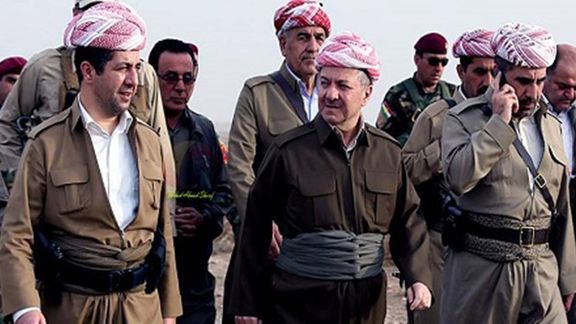
Fars news agency in Tehran affiliated with the Revolutionary Guard has harshly accused Iraqi Kurdish leaders of cooperating with foreign countries against Iran.
The tough-worded article says that Iraqi Kurdistan’s leadership has made northern Iraq a “backyard” for foreign intelligence services for creating insecurity in Iran and killing its nuclear scientists.
Iranian Kurdish separatist and opposition groups have bases in northern Iraq and Tehran often says they infiltrate into its territory for operations against government targets. The article by Fars accused the groups of assassinating a Kurdish shopkeeper a few days ago, who the insurgents thought supports the Islamic Republic.
Fars alleges that Kurdish leaders in northern Iraq “are fully aware” of operations and conspiracies against Iran and demands that the foreign ministry and the armed forces take actions against those responsible.
Iran last month used artillery and armed drones to attack targets in northern Iraq that it said were insurgent bases.
On October 7, Yahya Rahim-Safavi, the military adviser to Supreme Leader Ali Khamenei, warned Wednesday that Iran would not accept “any bordering country” hosting "anti-Iran terrorist groups."
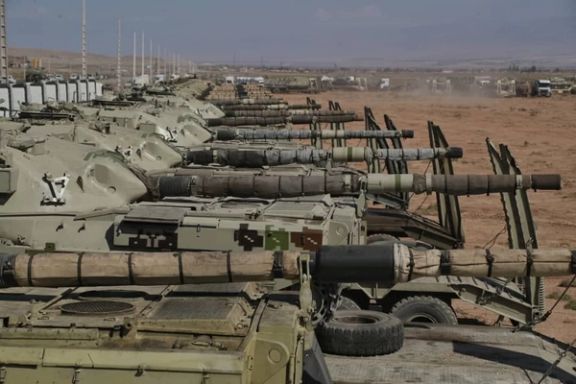
The ideology chief of the Revolutionary Guard has said that Iran will not allow “Takfiris or Zionist terrorists” to create a “nest” at its northwestern borders.
In recent weeks tensions have increased between the Islamic Republic and its northern neighbor Azerbaijan, with Iran accusing Baku of harboring Israeli and jihadist elements on its territory and attempting to change borders at the expense of Armenia.
General Rasul Sanaeirad, who is a deputy commander of the Islamic Revolution Guard Corps (IRGC) in charge of ideology said that Iran has been careful not to instigate conflicts and tensions over the years, but it had to conduct military drills last week to send a message.
Iran massed large number of troops and weapons near the Azerbaijani borders and held drills, citing exercises by Azerbaijan, Turkey and Pakistan near its borders.
Sanaeirad added that the military drills also send a message to “powers behind the scenes” who were instigating tensions. He did not name those countries.
He added, “Iran opposes any kind of geopolitical changes in the region and regards as important the security, territorial integrity and the rights of its neighbors.”